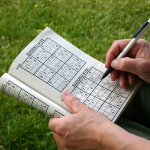 How often do you rely on strategic thinking as a part of your daily life? When we get into a routine with the same things that we do every morning, the same type of work at our job, and that same routine in the evening, we may not rely on strategic thinking very often. For the elderly individual who require some type a senior care, strategic thinking may be even less important for their regular life.
How often do you rely on strategic thinking as a part of your daily life? When we get into a routine with the same things that we do every morning, the same type of work at our job, and that same routine in the evening, we may not rely on strategic thinking very often. For the elderly individual who require some type a senior care, strategic thinking may be even less important for their regular life.
Yet strategic thinking can do wonders for memory and improving the quality of life for many elderly individuals. September is Strategic Thinking Month and it’s a good reminder that just because somebody has reached an advanced age, that doesn’t mean they don’t need to use their brain.
What is strategic thinking?
Strategic thinking is any type of activity where you have to make a plan, think about a solution, or process information in a way that helps you move toward achieving a goal. Certain board games rely on strategic thinking. Chess is the most famous game that requires a lot of strategic thinking. Checkers is another game that relies on planning, but not to the extent a chess does.
Doing a puzzle can also require the individual to have a plan to put all the pieces together. It isn’t going to require as much thought and planning as a game like chess, but doing a puzzle can work wonders to improve memory and mental function.
Playing the card game like Concentration where you have all of the cards face down and turn over two at a time, trying to match pairs, and keep track of which ones have been turned over will require a lot of thought, memory, and planning.
For those who have been diagnosed with any type of dementia, activities that require a lot of thought, concentration, and planning are often recommended to help reduce the impact of memory loss, or at least delay it. This type of strategic thinking can also help most other elderly individuals as well.
This month, for those relying on senior home services, the caregiver should introduce him or her to a variety of strategic thinking games and activities. The more that they take part in these activities, the more it will help them in the long run. If the caregiver is unfamiliar with a lot of strategic thinking games, and if the senior is interested in learning, they can both begin to take up the game of chess. There are plenty of simple teaching tools available to learn this classic game.
